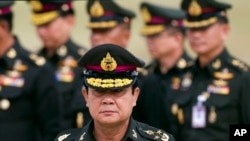Thailand's military government has stifled public dissent since seizing power last year, and now the country's universities say the junta's impact is being felt on campus.
According to a recent report by New York-based Human Rights Watch, since 2014 more than 750 people have been summoned to report to the military for "reconciliation’ talks" in which high profile politicians, activists and journalists have faced accusations of criticizing or opposing military rule.
Professors at the country's most elite universities have not been spared. Local activist network, the Internet Dialogue on Law Reform, says at least 65 of the detainees were lecturers and university professors called in for “attitude adjustment sessions.”
Academics, especially those teaching liberal arts subjects such as politics, say they are in the spotlight of the military government’s curbs on political debate and human rights.
Titipol Phakdeewanich, a political science lecturer at Ubon Ratchathani University in the country's northeast — a stronghold of ousted Prime Minister Yingluck Shinawatra — the army has been a regular presence in classrooms and seminars, including events involving international organizations.
“It’s a kind of a climate of fear and intimidation," he said. "Since I first found out that I was followed, I always think, even when I drive at night, whether I would be stopped by the military. This is a kind of fear in my mind that makes me quite concerned about everything — everything I taught.”
In October, Thai Prime Minister Prayuth Chan-ocha criticized university lecturers, accusing them of instigating rebellious thoughts and activities among students.
Following Prayuth’s comments, academics in the northern city Chiang Mai delivered a statement saying “universities were not military camps” and called for support of freedom of expression and debate at educational institutions.
Soon after, Chiang Mai police issued summonses for two of the academics involved, triggering a debate over academic freedom in Thailand.
Freedom House, an independent Washington-based watchdog for global freedom has downgraded Thailand’s press and social media status to “not free.” In its latest report, the group said the junta's National Council for Peace and Order (NCPO) had summoned more than 400 people for “interrogation” over their online activities.
Ekachai Chaninuvati, deputy dean of law at Siam University, says Thailand’s political problems cannot be solved by military means alone, but only by ending the increasing distrust between the military and community at large.
“If the military still thinks that they are different from the people and if the people still think they are different from the military, that won’t go anywhere,” he said.
In a year-end nationally televised speech, Prime Minister Prayuth reminded Thais that the junta seized power in order to reform the nation and draft a new constitution, adding that he expects democracy to return to the country following elections, which are expected in 2017.







